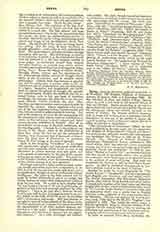

Devas, CHARLES STANTON, political economist, b. at Woodside, Old Windsor, England, of Protestant parents, August 26, 1848; d. November 6, 1906. He was educated at Eton and Balliol College, Oxford, where he took a first class in the honors School of Law and History. Before proceeding to the university he had been received into the Catholic Church and his subsequent career was entirely devoted to the service of religion. By treating political economy, both in books and lectures, from a definitely Catholic standpoint, he was one of the earliest to oppose the current teaching, which declined to consider history or ethics as relevant to the subject.
“The Groundwork of Economics” (1883), the first work published in his own name (for the translation into English of Hergenrother’s “Church and State” was anonymous), attracted considerable attention and was translated into German in 1896 by Dr. Walter Kampfe. The “Manual of Political Economy” (Stonyhurst Philosophical Series), published in 1892 (third edition, 1907), has achieved a more permanent success, and is now a recognized textbook in English-speaking schools and seminaries. In 1886 he published “Studies in Family Life“, an historical inquiry into this branch of economics, with a view to justify the contention that Christianity is an essential factor in the problem of social wellbeing. This book was translated into German in 1887 by Paul Maria Baumgarten. In 1895 he published anonymously in London a poetical version of the story of Sintram.
Besides his books he wrote frequently for “The Dublin Review”, “The Month”, and other periodicals, both English and American, and read papers before The British Association, The Manchester Statistical Society, The Catholic Truth Society, and other bodies. A considerable number of his later essays and lectures dealing with modern social problems have been issued by The Catholic Truth Society in pamphlet form, and his premature death was a severe loss to English Catholics in the confusion of the controversies raised by Socialism. His last, and perhaps his most important, book, “The Key to the World’s Progress”, was published in 1906. This, unlike his earlier works, is directly apologetic, being an elaborate defense of the Catholic Church written with a view to meeting the difficulties and questionings of the twentieth century. A popular edition has been issued since his death.
In 1874 he married Eliza Mary Katherine, the daughter of Francis Ridout Ward. She died in 1889, leaving nine children. Devas was a man of singular piety, a zealous member of the Society of St. Vincent of Paul, and an active friend of the poor; he had no other ambition except to propose the Catholic Faith to the reasonable acceptance of a troubled and sceptical age. He took a leading part in all Catholic enter-prises of his time in England—notably in that which enabled Catholics to frequent the universities—and though always unwilling to make himself personally prominent, he exercised considerable influence over the thought and conduct of English Catholics. He was examiner in Political Economy at the Royal University of Ireland from 1889 to 1898.
FRANCIS CHARLES DEVAS

